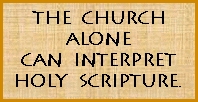| African theologian and apologist who became a Montanist. |
 |
|
Tertullian,
Prescription of Heretics
|
A prolific theologian,
Tertullian wrote both apologetic and polemical works. In his apologetic
works he defends and explains early Christianity to cultured critics.
In his writing for Christians, he maintains that Christianity is conducive
to good citizenship and salutary for the state. Writing for Christians
he urges a rigorous and disciplined Christianity. In his programmatic
early work, Prescription of Heretics, Tertullian argues that the
Catholic Church alone possesses truth and the proper interpretation of
Scripture. This need not, he maintains, be argued but only asserted. Tertullian
anticipates many leading themes of western theology in his writing, including
the strong western emphasis on original sin. He also anticipates the concepts
eventually used to settle the Trinitarian
and Christological
controversies
addressed at the Council
of Nicea I
(325) and Chalcedon
(451). At the end of his life, the rigorist and puritanical strain
in Tertullian's theology and his criticism of what he took to be Catholic
laxity led him to the Montanist
heresy.
|